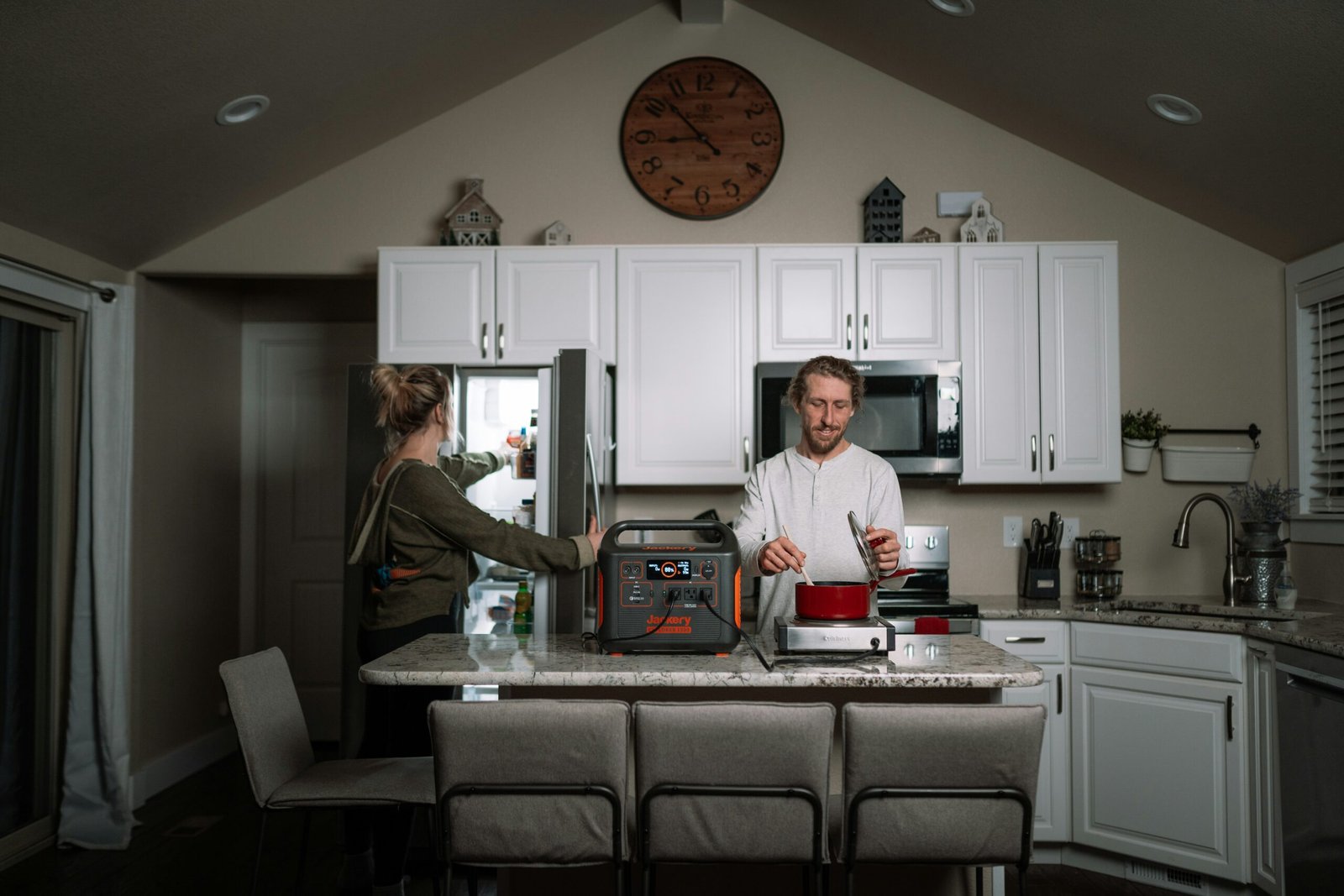Introduction to Smart Kitchen Appliances
The rapid advancement of technology has led to a significant transformation in household cooking environments, specifically through the emergence of smart kitchen appliances. These intelligent devices leverage artificial intelligence to enhance culinary experiences, allowing users to prepare meals more efficiently and with greater ease than ever before. Smart kitchen appliances include a variety of devices such as refrigerators, ovens, coffee makers, and slow cookers that have been designed with advanced features. These features often incorporate remote control capabilities, allowing users to manage cooking tasks from their smartphones or tablets, even when they are away from the kitchen.
In addition to remote control, many smart appliances offer automation options that reduce the time and effort required for meal preparation. For example, smart ovens can automatically adjust cooking times and temperatures based on the recipe being followed, ensuring perfect results with minimal input from the user. Furthermore, the connectivity of these appliances allows for seamless integration with other smart home systems, creating a harmonious environment where users can control multiple devices from a central platform. This connectivity enhances the overall cooking experience, making it more interactive and user-friendly.
The evolution of kitchen appliances has moved from traditional, manual devices to these innovative smart versions that integrate cutting-edge technology. As consumers are becoming increasingly health-conscious and time-sensitive, the appeal of smart kitchen appliances continues to grow. They not only streamline cooking processes but also provide personalization options, such as recipe suggestions based on dietary preferences. This shift represents a profound change in how people approach meal preparation and cooking, paving the way for a future where artificial intelligence plays a central role in everyday culinary tasks.
Key Features of AI-Driven Kitchen Appliances
The emergence of AI-driven kitchen appliances has significantly transformed the culinary landscape, introducing an array of innovative features that cater to both novice and experienced cooks. One of the prominent functionalities is voice control, which allows users to operate appliances hands-free. This feature enhances convenience, enabling multitasking and promoting a seamless cooking experience. By simply issuing voice commands, users can adjust temperatures, set timers, or initiate food preparation, thereby streamlining kitchen activities and minimizing distractions.
Another essential feature of these appliances is recipe suggestions. With built-in AI algorithms, smart kitchen devices can analyze available ingredients and propose tailored recipes, ensuring optimal utilization of resources. This capability not only saves time but also inspires creativity in meal preparation. As users explore diverse culinary options, they are encouraged to experiment with new flavors and techniques, which ultimately enhances their cooking skills and fosters healthier eating habits.
Cooking timers and reminders are integral components that support effective meal preparation. AI-driven appliances often come equipped with customizable timers that can be programmed for different phases of cooking, allowing users to focus on other tasks without the fear of overcooking. Additionally, some devices integrate meal planning features, which take the guesswork out of daily meals. By effortlessly organizing grocery lists and suggesting meals for the week, these appliances help users embrace a more structured approach to cooking.
Furthermore, sensor technology is a groundbreaking feature of AI kitchen appliances. With advanced sensors, these devices can monitor cooking conditions, such as temperature and humidity, ensuring optimal results. This technology not only aids in preventing overcooking but also promotes healthier meal preparation by providing real-time feedback. Overall, the integration of these features significantly enhances the culinary experience, making cooking more efficient, enjoyable, and health-conscious.
Popular AI-Driven Kitchen Appliances on the Market
As the culinary landscape shifts towards greater convenience and innovation, numerous AI-driven kitchen appliances are emerging to enhance food preparation and cooking experiences. Among the most notable appliances is the smart oven, equipped with sensors and connectivity features that allow for remote control and monitoring via mobile applications. These ovens often utilize machine learning algorithms to adjust cooking times and temperatures based on the specific dish being prepared, ensuring perfect results every time.
Next on the list is the AI-powered refrigerator, which boasts features such as inventory management and recipe suggestions based on available ingredients. These modern fridges can even help reduce food waste by alerting users to items nearing expiration and offering storage tips. Some models come with touchscreen interfaces that provide meal planning resources, showcasing the endless potential of blending technology with daily cooking routines.
The coffee maker is another prominent player in this ever-evolving kitchen ecosystem. Modern smart coffee makers utilize AI to create personalized brew recipes according to user preferences. Through mobile applications, coffee aficionados can schedule brew times and adjust strength and flavor profiles, ensuring each cup is perfectly tailored to their taste.
Lastly, multi-cookers equipped with AI capabilities combine the functions of several appliances into one versatile device. They can pressure cook, slow cook, sauté, and steam while learning from user habits to optimize cooking settings and times. This adaptability makes them an invaluable addition to any kitchen, particularly for those who appreciate efficiency without compromising quality.
In summary, the rise of AI-driven kitchen appliances offers a wealth of options for upgrading culinary experiences. From smart ovens and refrigerators to innovative coffee makers and versatile multi-cookers, these technologies cater to diverse cooking styles and preferences, transforming the preparation of meals into a seamless and enjoyable process.
Future Trends in Smart Kitchen Technology
As we look ahead, it is evident that the landscape of smart kitchen appliances is poised for transformative change driven by emerging technological advancements. One of the prominent trends shaping the future is the increased integration of machine learning within kitchen appliances. This technology enables devices to learn from user behavior and preferences, leading to more personalized cooking experiences. For instance, smart ovens may adapt cooking times and temperatures based on a user’s past cooking history, providing optimal results with minimal effort.
Data analytics is also playing a crucial role in the evolution of smart kitchen appliances. By leveraging vast amounts of data, manufacturers can develop intelligent systems that not only assist with meal preparation but also provide tailored recommendations for recipes and meal planning. With the ability to analyze nutritional values and suggest healthier alternatives, data-driven appliances can empower users to make informed dietary choices, facilitating a healthier lifestyle.
Moreover, sustainability is becoming increasingly important in the design and manufacturing of kitchen appliances. Future smart kitchens are likely to incorporate energy-efficient technologies and eco-friendly materials to reduce their environmental impact. As consumers become more eco-conscious, the demand for appliances that are not only smart but also sustainable will rise, prompting manufacturers to innovate in this direction.
The integration of smart kitchens within a broader smart home ecosystem is another trend likely to gain momentum. Interconnected systems will allow users to control multiple appliances through a central hub, streamlining cooking and home management processes. Voice-activated technologies and mobile applications will further augment this trend, making smart kitchens more accessible and user-friendly.
In conclusion, the future of AI-driven kitchen appliances is brimming with potential, characterized by the fusion of machine learning, data analytics, sustainability, and smart home integration. As these technologies continue to evolve, they promise to revolutionize the way we cook and manage our homes, leading to enhanced culinary experiences for users across the globe.









